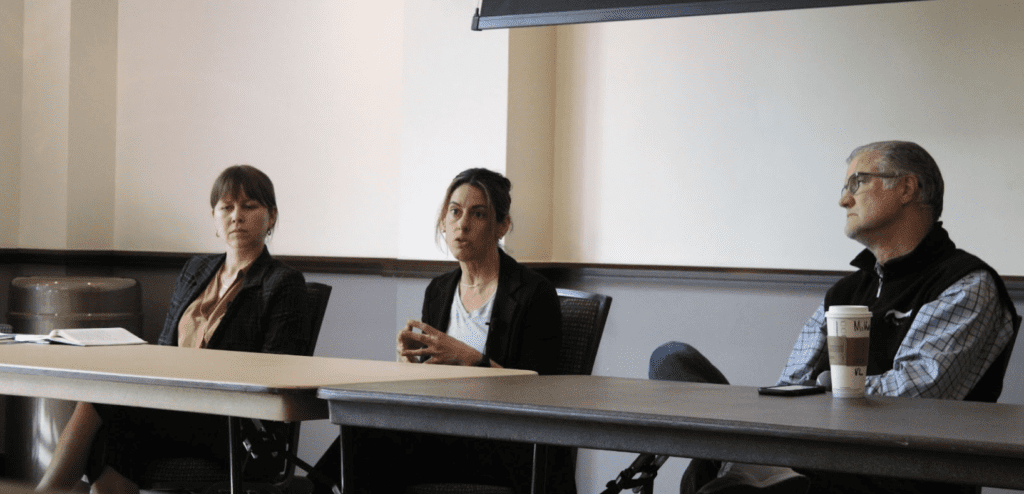As the chair of TCU’s environmental and sustainability sciences department, Michael Slattery is often asked whether he believes in global warming — the idea that human activity has driven an increase in gases such as carbon dioxide and methane, leading to higher than average temperatures worldwide.
Depending on his answer, Slattery said he expects to be put into one of two pigeon holes that he cannot crawl out of.
“I either say, ‘Yes, of course, I believe in global warming,’ — then I must be a Hillary voter and an Al Gore lover and off I go. Or if I say, ‘No, I don’t believe in global warming,’ then I must be on the other side of the fence,” Slattery said. “We’ve become so entrenched.”
Slattery was one of three panelists who tackled the complex challenges and politics related to discussions of climate change during a March 26 event hosted by TCU’s journalism department and the Pulitzer Center on Crisis Reporting. TCU is one of several universities partnered with the Washington, D.C.-based Pulitzer Center to fund student reporting projects in countries like Colombia, Ghana and South Africa.
Christian Science Monitor reporter Stephanie Hanes visited the campus to discuss her Pulitzer Center-funded series on young people and climate solutions. Political debates over global warming have become a uniquely American issue, she said.
“If you look at public opinion surveys internationally, we’re one of the unique places where this is a politicized, disputed issue,” Hanes said. “In other places, you might have debates over what to do about it, but the idea that the climate is changing and that the climate is changing because of greenhouse gases put into the air by humans, that’s just not up for debate.”
Hanes and Slattery attribute the divide among Americans to increasing political polarization, misinformation and mistrust in climate science.
About one-third of Americans think climate scientists understand very well whether climate change is happening, according to a 2023 Pew Research Center survey. At the same time, only 14% of Americans said there was no solid evidence that climate change is happening, and 63% said harm from global warming will get worse in their lifetime.
As a journalist, Hanes said, she tries to pursue stories that help readers understand that climate affects all parts of daily life, from urban heat islands to air quality and food systems.
“We’re trying to write about the stories that are the substance underneath that terminology,” Hanes said.
There’s a “real void” of in-depth environmental reporting in North Texas, said Evelyn Mayo, the co-chair of Dallas-Fort Worth environmental activism group Downwinders at Risk. While local news outlets occasionally report on environmental issues, the Fort Worth Report employs the only full-time environmental beat reporter in the region.
In turn, most local headlines tend to be broad or repeat national stories without digging into the impact on residents, Mayo said.
“I hope you all, as journalism students, can help fill that gap because it requires being at neighborhood association meetings, listening to residents share testimony about how when their AC goes off, it is a matter of life and death,” Mayo told the audience.
Climate change offers an opportunity for people to see themselves as part of a collective that must work together to address the impact of sea level rises, temperature increases and poor air quality, Mayo said.
“We’ll continue to have work, and hopefully we’ll all agree that it’s in all of our best interest to do that work,” she said.
There will be no “heroic stroke of genius” or technological solution that will solve climate change, Slattery said. But working to reduce the impact through investments in renewable energy and research should help communities both in Dallas-Fort Worth and around the world, he added.
Slattery cited his recent experience visiting Tonga, an island country in the South Pacific where TCU faculty members are researching energy security on behalf of the U.S. Department of Defense. While sea level rises won’t create waterfront property in North Texas any time soon, Tongans are already facing real consequences from global warming, Slattery said.
“They’re not debating whether climate change is real. They’re living it every day,” Slattery said. “They don’t worry if you’re Democrat or Republican. They need a sea wall and they need it quickly.”
Haley Samsel is the environmental reporter for the Fort Worth Report. You can reach them at haley.samsel@fortworthreport.org. At the Fort Worth Report, news decisions are made independently of our board members and financial supporters. Read more about our editorial independence policy here.

